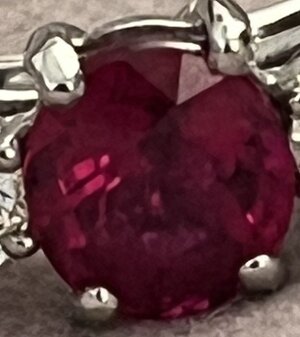LondonRuby
Rough_Rock
- Joined
- May 7, 2020
- Messages
- 90
Hi everyone,
I'm very interested in rubies and wondering if I did a stupid thing when I resold a ring last year...
It was a contemporary ring in white gold or platinum. I had bought it for £500 and it's not my style, as I prefer antiques. I did some due diligence, showing it to two jewellers who both refused to buy it, even for £500. The second one explained that he could easily find such stones. I was pretty sure if wasn't a Burma ruby, so then sold it to someone else who buys from me, for exactly what I'd paid. I reasoned I wouldn't get much more at auction.
Now I see that the jeweller has listed it for almost £10K! At least, it's incredibly similar to mine. It is apparently unheated, but not a Burmese ruby, and is just over 1 carat. I am really struggling to understand how it can be worth £10K. Is it just the case of a huge markup by an antique jeweller? I'm not a retailer so I'm always happy to sell for what retailers would pay at an auction, but really feel cheated, as the shop originally offered £750, then hummed and hawed until I was exhausted and sold it for less!
Any comments/advice much appreciated.
Thanks!
I'm very interested in rubies and wondering if I did a stupid thing when I resold a ring last year...
It was a contemporary ring in white gold or platinum. I had bought it for £500 and it's not my style, as I prefer antiques. I did some due diligence, showing it to two jewellers who both refused to buy it, even for £500. The second one explained that he could easily find such stones. I was pretty sure if wasn't a Burma ruby, so then sold it to someone else who buys from me, for exactly what I'd paid. I reasoned I wouldn't get much more at auction.
Now I see that the jeweller has listed it for almost £10K! At least, it's incredibly similar to mine. It is apparently unheated, but not a Burmese ruby, and is just over 1 carat. I am really struggling to understand how it can be worth £10K. Is it just the case of a huge markup by an antique jeweller? I'm not a retailer so I'm always happy to sell for what retailers would pay at an auction, but really feel cheated, as the shop originally offered £750, then hummed and hawed until I was exhausted and sold it for less!
Any comments/advice much appreciated.
Thanks!








300x240.png)